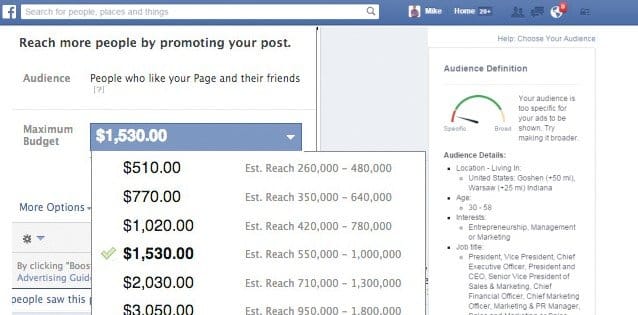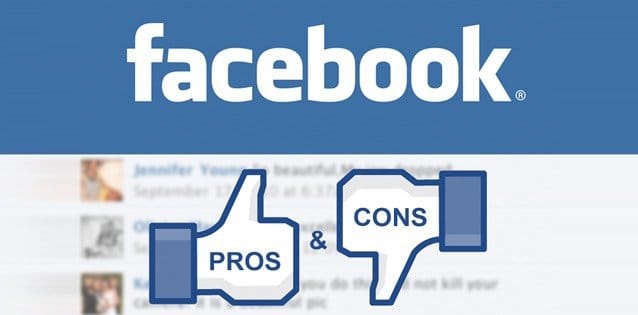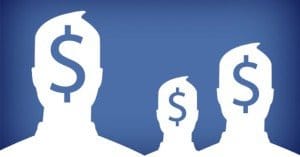 Written by ContentPowered.com
Written by ContentPowered.com
Time and again you’ll see articles like this one posted online. They go on and on about the benefits of Facebook ads, how many people you can reach, how little you have to spend, and how every business bar none should be diving headfirst into Facebook ads.
Are they right? Are Facebook ads the be-all and end-all solution to social advertising? Are they the God Solution to growing your brand presence and making money through social media? I’m not so sure.
Facebook Ad Reach is Great
There’s no denying that Facebook ads have insanely good reach. At last count, Facebook has passed more than 1.23 billion active users. Billion, with a B. The entire planet Earth has 7.1 billion people. That means one out of every seven people in the entire world is checking Facebook at least once per month. That’s a lot of people. That’s four times the population of the United States. That’s almost precisely the exact population of India or China.
Any one ad, given the right targeting and right budget, can reach a ton of people. We’re talking numbers ranging from thousands to millions. As that Moz article so politely puts it, for $1 you can reach 4,000 people. At that rate it would only cost you $307,5000 to reach everyone active monthly on Facebook.
Okay, so that’s not really a feasible ad budget. Still, the point is, Facebook reach through ads is potentially huge.
Facebook Objectives are Great
When you set up a Facebook ad objective, you’re essentially telling Facebook you want a specific action to be taken in association with your ad. Then you run it, and you pay depending on the objective and the targeting.
This allows you to pay a very low rate for views, or a slightly higher rate for clicks to your site, or a slightly higher rate for page likes, or an even higher rate for product conversions, and so on. The harder an objective is to get, the more expensive it gets.
Objectives are also tied to targeting. Facebook ads automatically select the people most likely to perform a given action based on the objective, which is why it’s so important to pick the right objective from the start.
Facebook Targeting is Excellent
Facebook harvests a ton of data. They harvest demographic data, geographic data, likes, interests, relationship status, educational level, income level, event attendance, basically everything. All of this is available for you to use for targeting. You can exclude anyone who likes The Walking Dead, you can include everyone in New Mexico who likes jelly doughnuts, you can specifically target people with associates degrees but not Bachelors; the sky is the limit. Entire articles can and have been written just on the subject of targeting. Why?
It’s Easy to Screw Up Targeting
Let’s say you’re running an ad and you realize you forgot to add some geographic targeting. Well, there goes your ad budget. You’ve just spent it all showing your ads to people outside of your service area. Whoops! Better luck next time.
This is the problem with poor targeting. The worst part is that it’s so hard to recognize whether or not your ads are targeting the wrong audience. You need to have an audience, you need to recognize who among that audience are most likely to convert, and you need to target those people. Any failure along the way will drastically drop your conversion rates and cost you more.
It’s Incredibly Easy to Overspend
When you create an ad, Facebook estimates your reach based on your targeting and your bid. You can set any bid you want, and put in a maximum budget, and Facebook will happily comply. They might very well run your ad through your entire budget and give you nothing in return. You need to increase your budget, they say, to increase your reach and compete better with others in the same niche.
If you keep listening to Facebook, you’ll end up spending an incredible amount on the same ads, with albeit somewhat better results. If you didn’t get better results, Facebook couldn’t get away with it. So you do better, and it encourages you to boost your bid that much more, in a cycle that ends with you spending way too much money on Facebook ads.
Facebook Tries to Trick You Into Spending More
Facebook has a number of hooks that try to get you to spend more. They critique your targeting algorithmically, and offer suggestions that might not always be the right choices. They offer the quick and easy Boost Post button, which spends a bunch on inefficient targeting. They’re slowly decreasing organic reach, to make paid reach more attractive or even necessary.
Fake Fans are Everywhere
Think fake fans are only something that happens to people who buy fans off Fiverr? Think again. Fake fans browse ads to find pages to like so they can obfuscate their activity. If you’re not very careful about geographic and language exclusions, you’re very likely going to end up with at least some of your budget eaten up by fake fans. There’s nothing you can really do about this, short of removing them when you find them and reporting their accounts to Facebook. You certainly won’t get a refund.
Facebook Ads are Part of a Complete Breakfast
All too often, I see people proclaiming Facebook ads don’t work. Sure, they don’t work, if you spend $5 and a week playing around with them expecting immediate results. If they plain didn’t work, Facebook would be dead as an advertising platform. Full stop. Therefore, Facebook ads work.
The thing is, you shouldn’t be relying on Facebook ads – or any one source of advertising – for all of your benefit. You shouldn’t be avoiding Facebook ads any more than you should be avoiding Google ads, or blog ads, or anything else. Advertise in numerous ways, for as much benefit as you can get from each.
Facebook Ads Require Work
This is the real verdict. Facebook ads are great, but only if you’re willing to put the time and energy into learning them, and the money into running them. Plenty of influential people proclaim they’re cheap, but they’re really not; not unless you know what you’re doing every step of the way. If you go in expecting to spend $1 a day on cheap ads full of value, you’ll be disappointed. If you go into it expecting to spend $5 or $10 and work your way down to $1, you’ll have a much better time.
Use Facebook ads, just don’t expect them to be a miracle in a jar.

